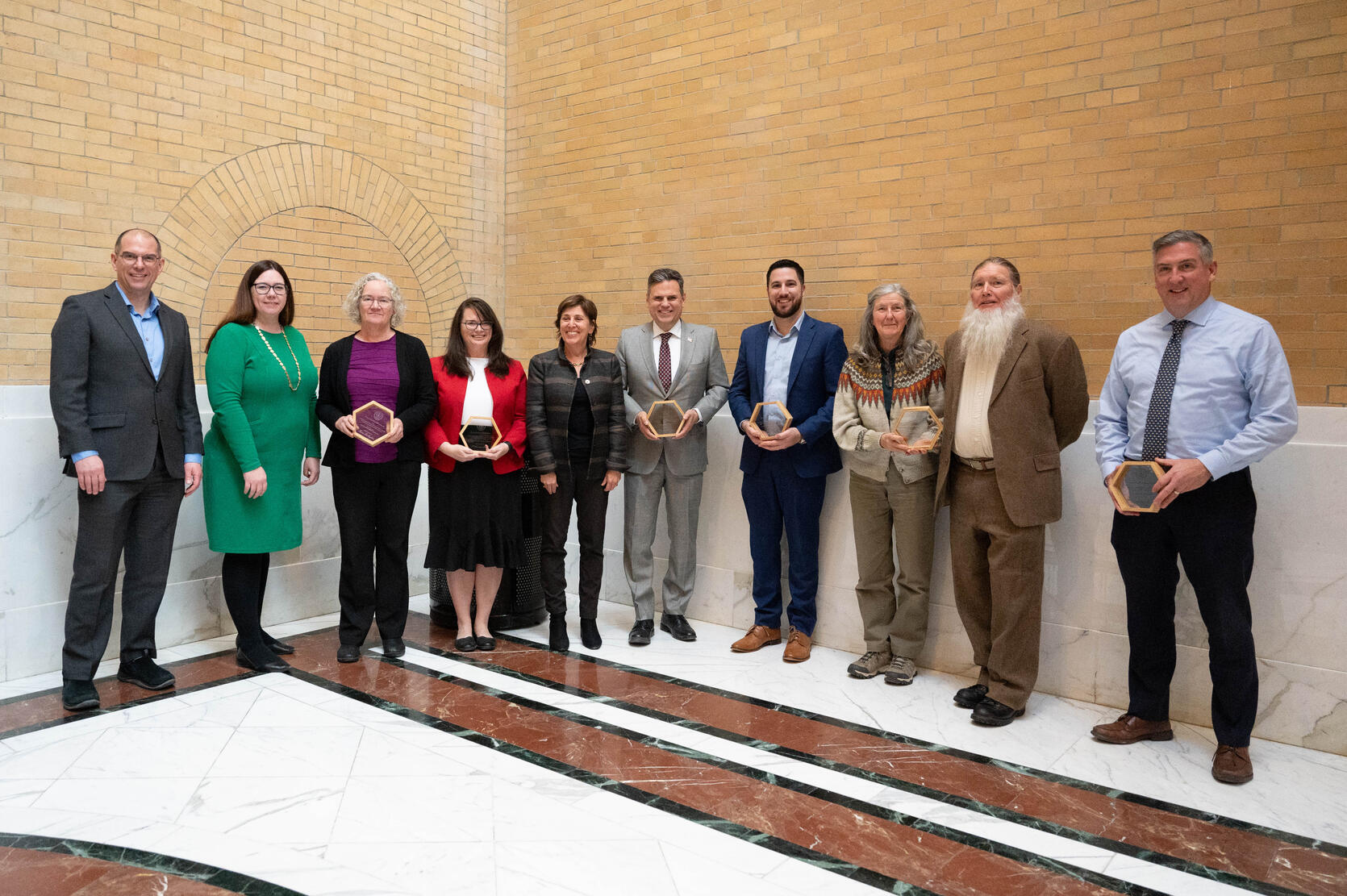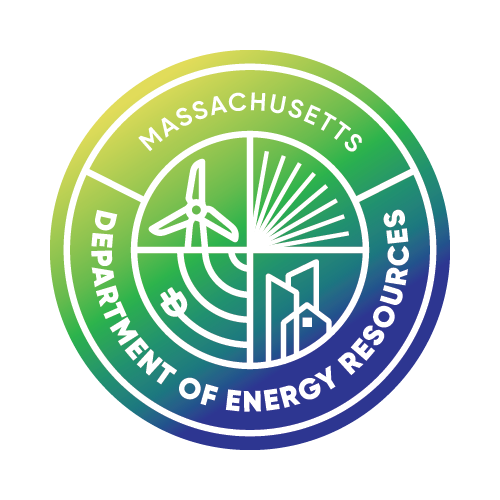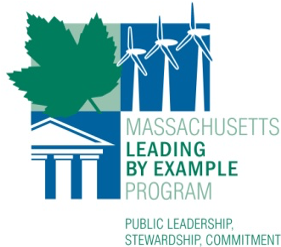- Massachusetts Department of Energy Resources
- Leading by Example
Media Contact
Lauren Diggin, External Affairs Manager

Boston — The Healey-Driscoll Administration today recognized six Massachusetts state entities, municipalities, and public sector individuals for their leadership in driving initiatives to decarbonize operations and reduce the environmental impacts and energy costs of state and municipal government at the 18th annual Leading by Example Awards Ceremony. Awardees were honored for implementing policies and successfully delivering projects that advance Massachusetts’ climate and clean energy goals. These efforts include deployment of innovative energy and energy efficiency technologies, building decarbonization projects, advancing fleet electrification, renewable energy projects, and a host of other initiatives that reduce environmental impacts and costs for state and municipal operations.
The 2024 awardees are:
- Office of Vehicle Management (OVM)
- Massachusetts State Police
- Town of Warwick
- City of Malden
- Tara Gallagher, Sustainability and Environmental Health & Safety Coordinator, Salem State University
- Katherine Moses, Sustainability Director, City of Lowell
“Trailblazers at the state and local level are leading by example every day to help Massachusetts achieve its climate goals,” said Energy and Environmental Affairs Secretary Rebecca Tepper. “Today’s award ceremony is a wonderful opportunity to celebrate their successes fighting climate change, lowering costs, and making Massachusetts a healthier place to live and work.”
“It makes us proud to see the dedication of our state and local partners to advance innovative clean energy initiatives that lower the costs and environmental impacts of government,” said Energy Resources Commissioner Elizabeth Mahony. “We are thankful for their steadfast efforts to advance our energy transition and create healthier communities across Massachusetts.”
“DCAMM is proud to support and partner with many of the awardees who are making such significant contributions to decarbonization, energy efficiency, and climate resilience in their communities and agencies,” said DCAMM Commissioner Adam Baacke. “Congratulations to the honorees for their well-deserved recognition.”
The Leading by Example (LBE) program is administered by the Department of Energy Resources (DOER) and works collaboratively with state agencies and public colleges and universities to advance decarbonization, clean energy and sustainability practices that reduce the environmental impacts of state government operations. Cities and towns across the Commonwealth receive similar support and grant funding through DOER’s Green Communities Division. The awards were presented at the Massachusetts State House by Energy and Environmental Affairs (EEA) Secretary Rebecca Tepper, Department of Energy Resources Commissioner Elizabeth Mahony, and Division of Capital Asset Management and Maintenance (DCAMM) Commissioner Adam Baacke.
State agencies and public higher education campuses have made significant clean energy and sustainability progress, including collectively installing 33 megawatts of solar PV, reducing heating oil use by more than 88 percent, installing 518 electric vehicle charging stations with a total of 917 ports, and creating and managing about 376 acres of pollinator habitats on state lands, all of which has contributed to a reduction in greenhouse gas emissions from onsite fossil fuel use by about 24 percent from a 2004 baseline.
On the municipal side, 297 of Massachusetts’ 351 cities and towns hold a Green Communities designation. Approximately 90 percent of Massachusetts’ residents live in a Green Community. These 297 communities have each committed to reduce municipal energy consumption by 20 percent over five years. More than $185 million in Designation Grants and Competitive Grants have been awarded to Green Communities since the program began in 2009 to fund clean energy and energy efficiency projects across municipal buildings, facilities, and schools.
The six Massachusetts state entities, municipalities, and public sector individuals who received awards for their leadership are:
State Entity Awardees
The Office of Vehicle Management (OVM) is a major driver of state fleet electrification, and under its leadership the state has already achieved the 2025 electric vehicle (EV) goal of 5 percent set by Executive Order 594. OVM released an Electric Vehicle Planning and Acquisition Policy that requires executive branch agencies to develop fleet electrification plans to meet EO594 goals by 2030, prioritizing battery electric vehicles. OVM also established the Leased Electric Vehicle Inventory (LEVI) Program, which allows agencies to lease EVs, removing the obstacles of fleet availability and delivery delays. Through the LEVI program, almost 200 vehicles were purchased to overcome the inventory and availability challenges for early EV adopters.
The Massachusetts State Police (MSP) has advanced numerous clean energy and decarbonization initiatives. It fully electrified the HVAC systems in its Lower Basin Barracks building, resulting in a 90 percent reduction in fossil fuels. This renovation of a building recognized by the National Historic Register also included sustainable stormwater management practices and additional greenspace onsite. MSP constructed a 374 kW solar canopy in its General Headquarters parking lot. The canopy is projected to save the Commonwealth $554,000 and avoid 402,000 lbs. of CO2 annually. MSP also deployed its first EVs on Martha's Vineyard and Nantucket, and installed EV charging stations across the state for its future fleet.
Municipal Awardees
The Town of Warwick, located in Franklin County, has cut its municipal energy use by more than twenty percent since becoming a Green Community in 2014. Warwick has implemented a host of decarbonization efforts such as air sealing at town hall, heating the town hall and fire department with air source heat pumps, hosting an out-of-town solar field, and purchasing electric and hybrid vehicles for the town. Warwick's Building and Energy Committee (BEC) has raised awareness of its sustainability and energy efficiency efforts with residents through communication and community outreach initiatives.
The City of Malden, located in Middlesex County, has reduced its total energy consumption by nearly 30 percent since becoming a Green Community in 2017 through strategies including weatherization, energy management systems upgrades and energy conservation measures. Malden has decarbonized numerous municipal buildings through electrification of heating and cooling and water heating systems. Malden added a solar system on the Department of Public Works building, and started a project to build an innovative solar thermal system on the high school roof that will provide solar-heated water for the competition size swimming pool.
Public Sector Individual Awardees
Tara Gallagher has played a key environmental leadership role as Salem State University’s Sustainability and Environmental Health & Safety Coordinator. After working with Leading By Example to secure funding to develop one of the early state government decarbonization roadmaps, Tara steers efforts to implement the roadmap. Tara is spearheading a $30 million decarbonization project, the first of a broad set of projects to dramatically reduce the use of fossil fuels at Salem State. Tara led efforts to install electric vehicle charging ports on campus and is now working to accelerate the transition of the University’s fleet to EVs. Tara facilitated the installation of rooftop solar on four buildings, and two additional rooftop solar projects and a solar canopy are in development - all of which reduce Salem State’s energy costs.
Katherine Moses was named the City of Lowell's first Sustainability Director in October 2023. Since then, Katherine has secured more than $21 million in grant funding and $1.8 million in utility incentives for energy efficiency and decarbonization projects in Lowell. Katherine developed the RELIEF (Reducing Emissions in Lowell through Infrastructure and Efficiency First) program to spur decarbonization and emissions reductions. The goal of RELIEF is to prepare Lowell public school buildings for net zero emissions by 2035 through initiatives such as building energy retrofits, infrastructure upgrades to enable renewable energy integration, decarbonization of heating fuels, and more. Katherine has overseen energy efficiency projects and initiatives including solar, LED lighting, low-income weatherization, and heat pump informational sessions for the city. Katherine was named Local Solar Leader of the Year by the Solar Energy Business Association of New England and serves on the Building Electrification Accelerator’s Municipal Staff Working Group and MSBA Heat Pump Study.
###

